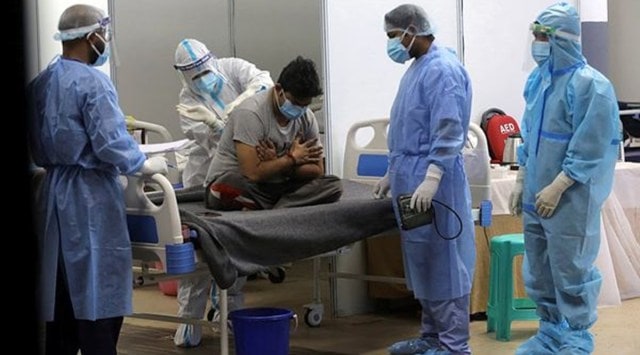- India
- International
Amid rush & shortage: Wardha hospital reduced Remdesivir use, said it made ‘no difference’ to patients
According to the guidelines, Remdesivir should not be used for patients with mild Covid-19 symptoms, who are in home care or at Covid Care Centres.
 Later, one more drug, Favipravir, was thought of as a magic shot by the people, the doctor said. (Express Photo/Representative)
Later, one more drug, Favipravir, was thought of as a magic shot by the people, the doctor said. (Express Photo/Representative)IN THE first week of March, days after the second wave began and panicked families of Covid-19 patients frantically looked for Remdesivir, doctors at one hospital in Maharashtra’s Wardha took a deliberate decision not to prescribe the antiviral drug and managed to reduce its usage, almost entirely, from its line of treatment.
Dr S P Kalantri, the medical superintendent of Mahatma Gandhi Institute of Medical Sciences at Sevagram, told The Indian Express, they had decreased the use of Remdesvir by 90 per cent from March 2021 onwards after they observed that it made “no difference” but had side-effects on patients. Amid rush & shortage: Wardha hospital reduced Remdesivir use, said it made ‘no difference’ to patients
“We had given Remdesivir (to patients) for two to three months last year and realised there was an excessive usage (of the drug) and treatment costs had soared. Patients were paying Rs 20,000 for one vial (of the drug) when the cost of the same was just Rs 1,000. We decreased the use of Remdesvir by 90 per cent from March 2021. We observed it makes no difference but has its own side-effects and can even lead to kidney or heart problems,” Dr Kalantri said.
The World Health Organisation’s multi-country Solidarity Therapeutic Trials had earlier concluded that Remdesivir (as also three other therapeutic regimens) “appeared to have little or no effect on hospitalised Covid-19, as indicated by overall mortality, initiation of ventilation and duration of hospital stay”.
Earlier this week, the Union Health Ministry, too, issued guidelines for the “rational use of Remdesivir”, stating that it should be used “only in select moderate/ severe hospitalised Covid-19 patients on supplemental oxygen as it is a reserve drug approved under emergency use authorisation only based on limited scientific evidence globally”.

According to the guidelines, it should not be used for patients with mild Covid-19 symptoms, who are in home care or at Covid Care Centres.
The guidelines cautioned that Remdesivir was an experimental or emergency use authorisation drug, “with potential to harm, (and) has relatively high cost and has limited availability”.
Kalantri, who is also on the Wardha district Covid task force, said: “Our line of treatment is driven by science and not by anecdotes or personal experiences and personal views. We are also not influenced by large pharma bodies.’’
The hospital has treated a total of 5,300 patients since the pandemic began, and as many as 2,900 of them since March this year. A total of 770 Covid deaths has been reported at the hospital since last year.
During the second wave of the pandemic, Dr Kalantri said the hospital prescribed Remdesevir only in 10 per cent cases where it was “clinically indicated”. He added that some patients had asked for Remdesevir, but the number was not so large and he educated them on when it should be administered.
During the first wave, Dr Kalantri said the hospital took a similar stand on the use Hydroxychloroquine. “There is no evidence that it either (of the two drugs – Hydroxychloroquine or Remdesevir) cures or prevents (Covid-19). HCQ was also used by the police, frontline workers and lakhs of people. Then trials were done and it was found that hydroxychloroquine was of no use,” he said.
Later, one more drug, Favipravir, was thought of as a magic shot by the people, the doctor said. “In August last year, a full course of Favipravir would cost Rs 13,500 and many in Wardha could not afford it. We thought this was not morally correct, and we are exposing our patients to the clinically unproven drug as there was a small trial on 150 patients to prove its efficacy. So, we didn’t stock this drug,” Dr Kalantri said, adding it was never used in the hospital.
Nearly 80 per cent of the patients admitted to the hospital are from rural areas, underprivileged and less affluent sections of society. The hospital is now strengthening its infrastructure, manpower and training for a possible third wave, Dr Kalantri said.
Apr 19: Latest News
- 01
- 02
- 03
- 04
- 05






































